PPMP20009 Project Management Methodologies: Consolidated Portfolio
VerifiedAdded on 2023/06/12
|12
|2626
|67
Report
AI Summary
This portfolio provides a consolidated overview of project management methodologies within the context of the PPMP20009 course. It delves into the reasons organizations adopt these methodologies, critically analyzes their impact on stakeholders, and explains key elements of methodologies like Prince2. The report covers topics such as strategic alignment, complexity in projects, quality management, change management, and continuous improvement. It also touches upon the project management lifecycle, the roles of project managers, and the importance of aligning methodologies with project objectives and company strategy. The student's personal experiences in the telecommunication and construction industries are integrated to illustrate the practical application and evolution of these methodologies.
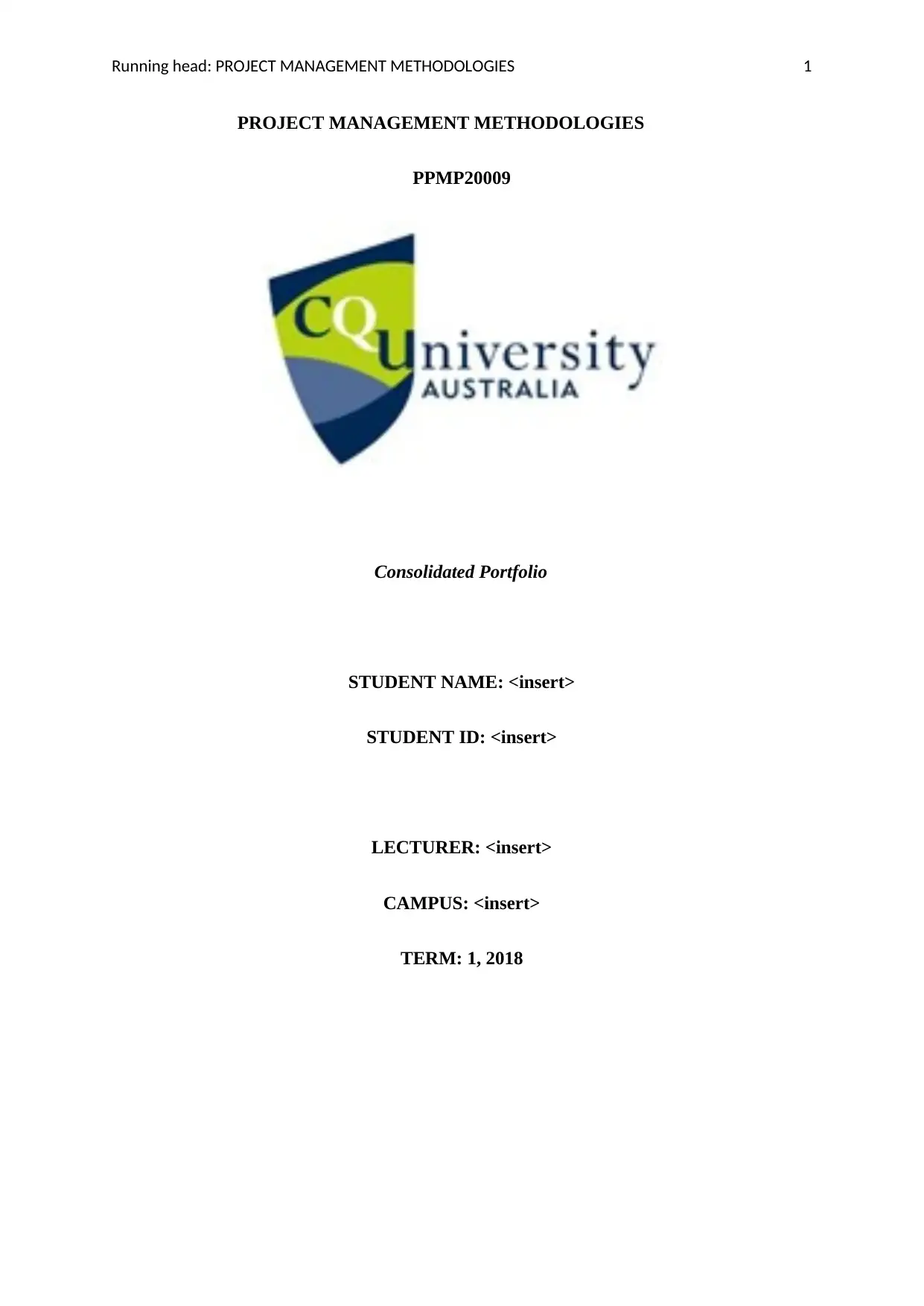
Running head: PROJECT MANAGEMENT METHODOLOGIES 1
PROJECT MANAGEMENT METHODOLOGIES
PPMP20009
Consolidated Portfolio
STUDENT NAME: <insert>
STUDENT ID: <insert>
LECTURER: <insert>
CAMPUS: <insert>
TERM: 1, 2018
PROJECT MANAGEMENT METHODOLOGIES
PPMP20009
Consolidated Portfolio
STUDENT NAME: <insert>
STUDENT ID: <insert>
LECTURER: <insert>
CAMPUS: <insert>
TERM: 1, 2018
Paraphrase This Document
Need a fresh take? Get an instant paraphrase of this document with our AI Paraphraser
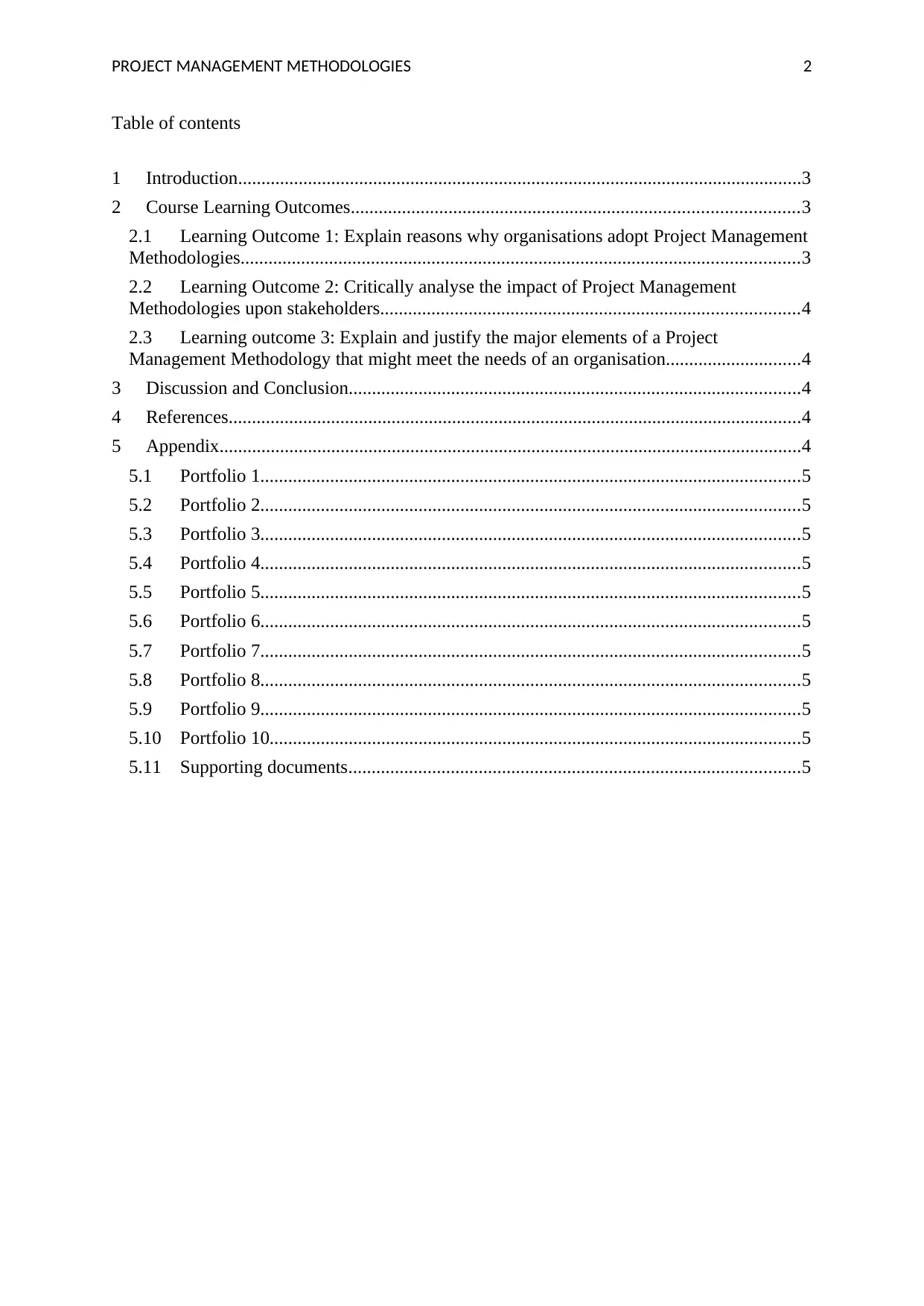
PROJECT MANAGEMENT METHODOLOGIES 2
Table of contents
1 Introduction.........................................................................................................................3
2 Course Learning Outcomes................................................................................................3
2.1 Learning Outcome 1: Explain reasons why organisations adopt Project Management
Methodologies........................................................................................................................3
2.2 Learning Outcome 2: Critically analyse the impact of Project Management
Methodologies upon stakeholders..........................................................................................4
2.3 Learning outcome 3: Explain and justify the major elements of a Project
Management Methodology that might meet the needs of an organisation.............................4
3 Discussion and Conclusion.................................................................................................4
4 References...........................................................................................................................4
5 Appendix.............................................................................................................................4
5.1 Portfolio 1....................................................................................................................5
5.2 Portfolio 2....................................................................................................................5
5.3 Portfolio 3....................................................................................................................5
5.4 Portfolio 4....................................................................................................................5
5.5 Portfolio 5....................................................................................................................5
5.6 Portfolio 6....................................................................................................................5
5.7 Portfolio 7....................................................................................................................5
5.8 Portfolio 8....................................................................................................................5
5.9 Portfolio 9....................................................................................................................5
5.10 Portfolio 10..................................................................................................................5
5.11 Supporting documents.................................................................................................5
Table of contents
1 Introduction.........................................................................................................................3
2 Course Learning Outcomes................................................................................................3
2.1 Learning Outcome 1: Explain reasons why organisations adopt Project Management
Methodologies........................................................................................................................3
2.2 Learning Outcome 2: Critically analyse the impact of Project Management
Methodologies upon stakeholders..........................................................................................4
2.3 Learning outcome 3: Explain and justify the major elements of a Project
Management Methodology that might meet the needs of an organisation.............................4
3 Discussion and Conclusion.................................................................................................4
4 References...........................................................................................................................4
5 Appendix.............................................................................................................................4
5.1 Portfolio 1....................................................................................................................5
5.2 Portfolio 2....................................................................................................................5
5.3 Portfolio 3....................................................................................................................5
5.4 Portfolio 4....................................................................................................................5
5.5 Portfolio 5....................................................................................................................5
5.6 Portfolio 6....................................................................................................................5
5.7 Portfolio 7....................................................................................................................5
5.8 Portfolio 8....................................................................................................................5
5.9 Portfolio 9....................................................................................................................5
5.10 Portfolio 10..................................................................................................................5
5.11 Supporting documents.................................................................................................5
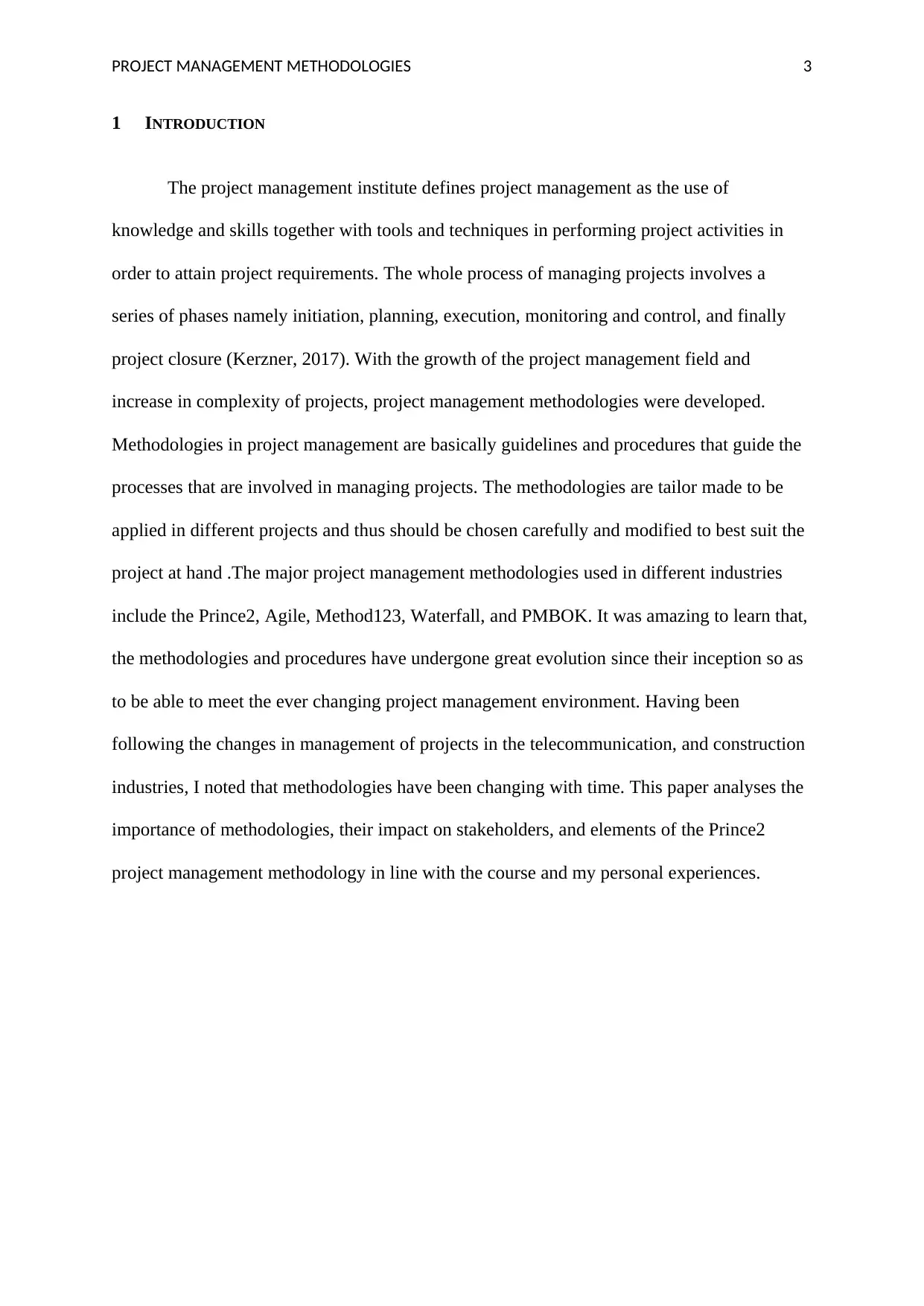
PROJECT MANAGEMENT METHODOLOGIES 3
1 INTRODUCTION
The project management institute defines project management as the use of
knowledge and skills together with tools and techniques in performing project activities in
order to attain project requirements. The whole process of managing projects involves a
series of phases namely initiation, planning, execution, monitoring and control, and finally
project closure (Kerzner, 2017). With the growth of the project management field and
increase in complexity of projects, project management methodologies were developed.
Methodologies in project management are basically guidelines and procedures that guide the
processes that are involved in managing projects. The methodologies are tailor made to be
applied in different projects and thus should be chosen carefully and modified to best suit the
project at hand .The major project management methodologies used in different industries
include the Prince2, Agile, Method123, Waterfall, and PMBOK. It was amazing to learn that,
the methodologies and procedures have undergone great evolution since their inception so as
to be able to meet the ever changing project management environment. Having been
following the changes in management of projects in the telecommunication, and construction
industries, I noted that methodologies have been changing with time. This paper analyses the
importance of methodologies, their impact on stakeholders, and elements of the Prince2
project management methodology in line with the course and my personal experiences.
1 INTRODUCTION
The project management institute defines project management as the use of
knowledge and skills together with tools and techniques in performing project activities in
order to attain project requirements. The whole process of managing projects involves a
series of phases namely initiation, planning, execution, monitoring and control, and finally
project closure (Kerzner, 2017). With the growth of the project management field and
increase in complexity of projects, project management methodologies were developed.
Methodologies in project management are basically guidelines and procedures that guide the
processes that are involved in managing projects. The methodologies are tailor made to be
applied in different projects and thus should be chosen carefully and modified to best suit the
project at hand .The major project management methodologies used in different industries
include the Prince2, Agile, Method123, Waterfall, and PMBOK. It was amazing to learn that,
the methodologies and procedures have undergone great evolution since their inception so as
to be able to meet the ever changing project management environment. Having been
following the changes in management of projects in the telecommunication, and construction
industries, I noted that methodologies have been changing with time. This paper analyses the
importance of methodologies, their impact on stakeholders, and elements of the Prince2
project management methodology in line with the course and my personal experiences.
⊘ This is a preview!⊘
Do you want full access?
Subscribe today to unlock all pages.

Trusted by 1+ million students worldwide
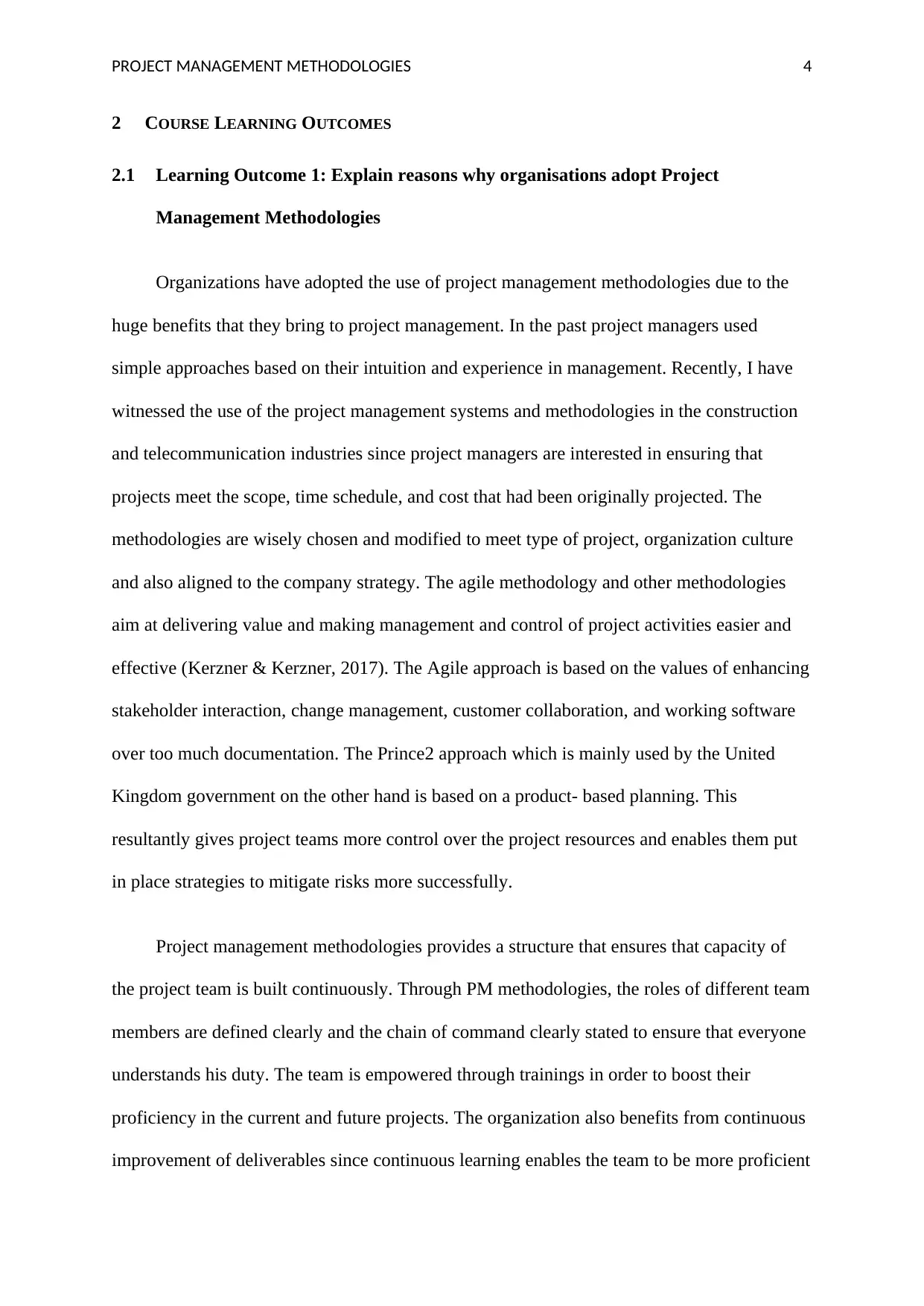
PROJECT MANAGEMENT METHODOLOGIES 4
2 COURSE LEARNING OUTCOMES
2.1 Learning Outcome 1: Explain reasons why organisations adopt Project
Management Methodologies
Organizations have adopted the use of project management methodologies due to the
huge benefits that they bring to project management. In the past project managers used
simple approaches based on their intuition and experience in management. Recently, I have
witnessed the use of the project management systems and methodologies in the construction
and telecommunication industries since project managers are interested in ensuring that
projects meet the scope, time schedule, and cost that had been originally projected. The
methodologies are wisely chosen and modified to meet type of project, organization culture
and also aligned to the company strategy. The agile methodology and other methodologies
aim at delivering value and making management and control of project activities easier and
effective (Kerzner & Kerzner, 2017). The Agile approach is based on the values of enhancing
stakeholder interaction, change management, customer collaboration, and working software
over too much documentation. The Prince2 approach which is mainly used by the United
Kingdom government on the other hand is based on a product- based planning. This
resultantly gives project teams more control over the project resources and enables them put
in place strategies to mitigate risks more successfully.
Project management methodologies provides a structure that ensures that capacity of
the project team is built continuously. Through PM methodologies, the roles of different team
members are defined clearly and the chain of command clearly stated to ensure that everyone
understands his duty. The team is empowered through trainings in order to boost their
proficiency in the current and future projects. The organization also benefits from continuous
improvement of deliverables since continuous learning enables the team to be more proficient
2 COURSE LEARNING OUTCOMES
2.1 Learning Outcome 1: Explain reasons why organisations adopt Project
Management Methodologies
Organizations have adopted the use of project management methodologies due to the
huge benefits that they bring to project management. In the past project managers used
simple approaches based on their intuition and experience in management. Recently, I have
witnessed the use of the project management systems and methodologies in the construction
and telecommunication industries since project managers are interested in ensuring that
projects meet the scope, time schedule, and cost that had been originally projected. The
methodologies are wisely chosen and modified to meet type of project, organization culture
and also aligned to the company strategy. The agile methodology and other methodologies
aim at delivering value and making management and control of project activities easier and
effective (Kerzner & Kerzner, 2017). The Agile approach is based on the values of enhancing
stakeholder interaction, change management, customer collaboration, and working software
over too much documentation. The Prince2 approach which is mainly used by the United
Kingdom government on the other hand is based on a product- based planning. This
resultantly gives project teams more control over the project resources and enables them put
in place strategies to mitigate risks more successfully.
Project management methodologies provides a structure that ensures that capacity of
the project team is built continuously. Through PM methodologies, the roles of different team
members are defined clearly and the chain of command clearly stated to ensure that everyone
understands his duty. The team is empowered through trainings in order to boost their
proficiency in the current and future projects. The organization also benefits from continuous
improvement of deliverables since continuous learning enables the team to be more proficient
Paraphrase This Document
Need a fresh take? Get an instant paraphrase of this document with our AI Paraphraser
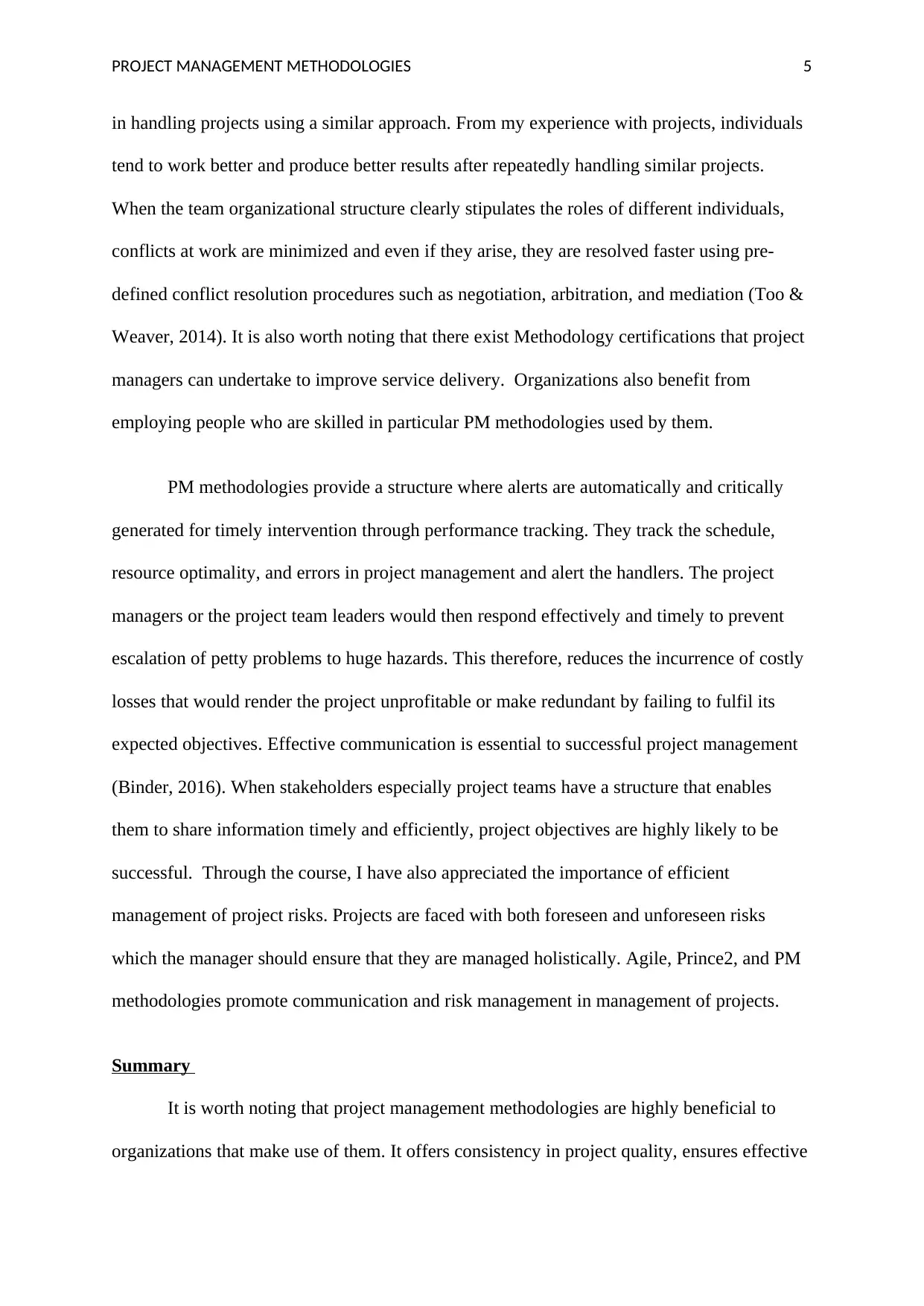
PROJECT MANAGEMENT METHODOLOGIES 5
in handling projects using a similar approach. From my experience with projects, individuals
tend to work better and produce better results after repeatedly handling similar projects.
When the team organizational structure clearly stipulates the roles of different individuals,
conflicts at work are minimized and even if they arise, they are resolved faster using pre-
defined conflict resolution procedures such as negotiation, arbitration, and mediation (Too &
Weaver, 2014). It is also worth noting that there exist Methodology certifications that project
managers can undertake to improve service delivery. Organizations also benefit from
employing people who are skilled in particular PM methodologies used by them.
PM methodologies provide a structure where alerts are automatically and critically
generated for timely intervention through performance tracking. They track the schedule,
resource optimality, and errors in project management and alert the handlers. The project
managers or the project team leaders would then respond effectively and timely to prevent
escalation of petty problems to huge hazards. This therefore, reduces the incurrence of costly
losses that would render the project unprofitable or make redundant by failing to fulfil its
expected objectives. Effective communication is essential to successful project management
(Binder, 2016). When stakeholders especially project teams have a structure that enables
them to share information timely and efficiently, project objectives are highly likely to be
successful. Through the course, I have also appreciated the importance of efficient
management of project risks. Projects are faced with both foreseen and unforeseen risks
which the manager should ensure that they are managed holistically. Agile, Prince2, and PM
methodologies promote communication and risk management in management of projects.
Summary
It is worth noting that project management methodologies are highly beneficial to
organizations that make use of them. It offers consistency in project quality, ensures effective
in handling projects using a similar approach. From my experience with projects, individuals
tend to work better and produce better results after repeatedly handling similar projects.
When the team organizational structure clearly stipulates the roles of different individuals,
conflicts at work are minimized and even if they arise, they are resolved faster using pre-
defined conflict resolution procedures such as negotiation, arbitration, and mediation (Too &
Weaver, 2014). It is also worth noting that there exist Methodology certifications that project
managers can undertake to improve service delivery. Organizations also benefit from
employing people who are skilled in particular PM methodologies used by them.
PM methodologies provide a structure where alerts are automatically and critically
generated for timely intervention through performance tracking. They track the schedule,
resource optimality, and errors in project management and alert the handlers. The project
managers or the project team leaders would then respond effectively and timely to prevent
escalation of petty problems to huge hazards. This therefore, reduces the incurrence of costly
losses that would render the project unprofitable or make redundant by failing to fulfil its
expected objectives. Effective communication is essential to successful project management
(Binder, 2016). When stakeholders especially project teams have a structure that enables
them to share information timely and efficiently, project objectives are highly likely to be
successful. Through the course, I have also appreciated the importance of efficient
management of project risks. Projects are faced with both foreseen and unforeseen risks
which the manager should ensure that they are managed holistically. Agile, Prince2, and PM
methodologies promote communication and risk management in management of projects.
Summary
It is worth noting that project management methodologies are highly beneficial to
organizations that make use of them. It offers consistency in project quality, ensures effective
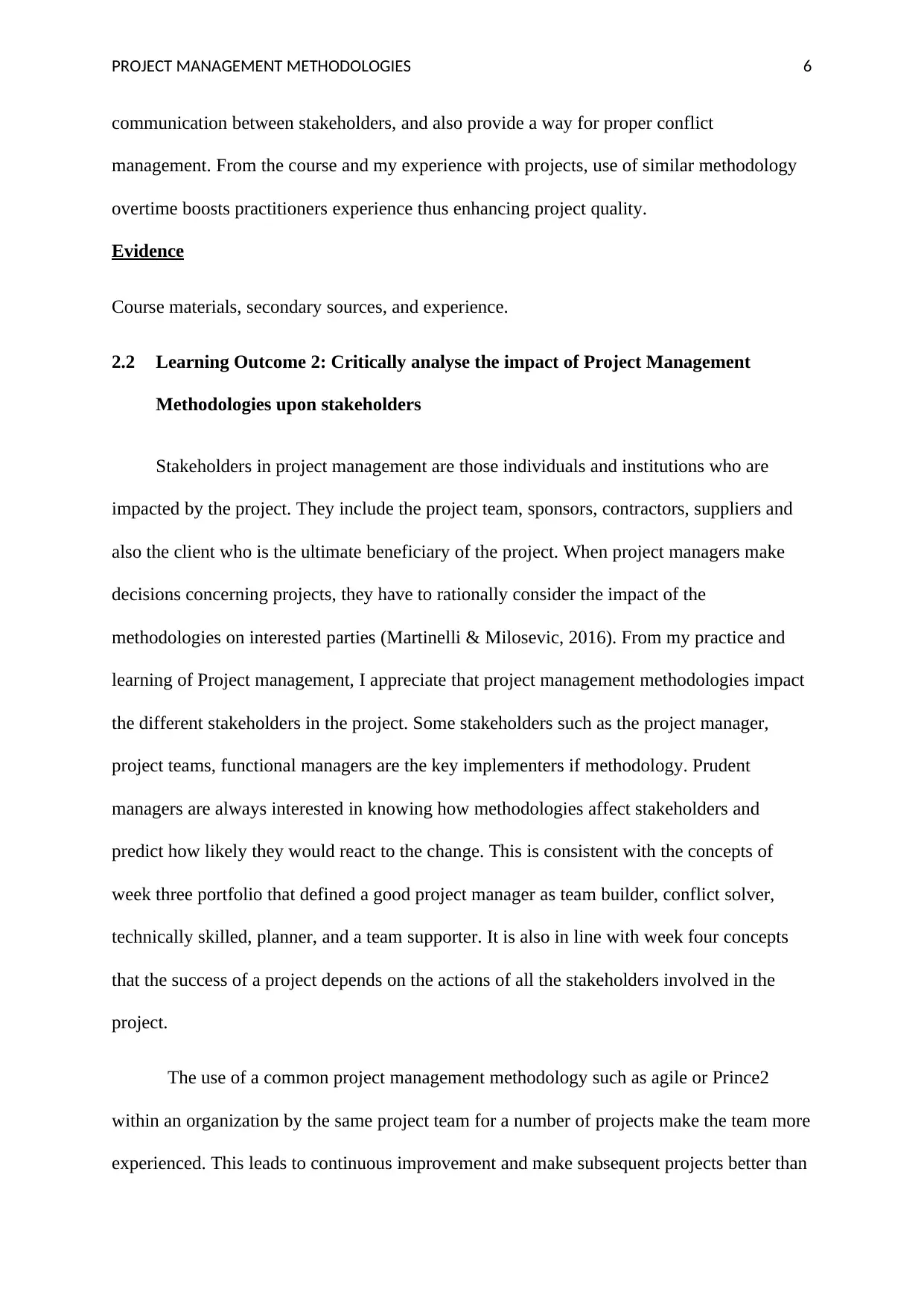
PROJECT MANAGEMENT METHODOLOGIES 6
communication between stakeholders, and also provide a way for proper conflict
management. From the course and my experience with projects, use of similar methodology
overtime boosts practitioners experience thus enhancing project quality.
Evidence
Course materials, secondary sources, and experience.
2.2 Learning Outcome 2: Critically analyse the impact of Project Management
Methodologies upon stakeholders
Stakeholders in project management are those individuals and institutions who are
impacted by the project. They include the project team, sponsors, contractors, suppliers and
also the client who is the ultimate beneficiary of the project. When project managers make
decisions concerning projects, they have to rationally consider the impact of the
methodologies on interested parties (Martinelli & Milosevic, 2016). From my practice and
learning of Project management, I appreciate that project management methodologies impact
the different stakeholders in the project. Some stakeholders such as the project manager,
project teams, functional managers are the key implementers if methodology. Prudent
managers are always interested in knowing how methodologies affect stakeholders and
predict how likely they would react to the change. This is consistent with the concepts of
week three portfolio that defined a good project manager as team builder, conflict solver,
technically skilled, planner, and a team supporter. It is also in line with week four concepts
that the success of a project depends on the actions of all the stakeholders involved in the
project.
The use of a common project management methodology such as agile or Prince2
within an organization by the same project team for a number of projects make the team more
experienced. This leads to continuous improvement and make subsequent projects better than
communication between stakeholders, and also provide a way for proper conflict
management. From the course and my experience with projects, use of similar methodology
overtime boosts practitioners experience thus enhancing project quality.
Evidence
Course materials, secondary sources, and experience.
2.2 Learning Outcome 2: Critically analyse the impact of Project Management
Methodologies upon stakeholders
Stakeholders in project management are those individuals and institutions who are
impacted by the project. They include the project team, sponsors, contractors, suppliers and
also the client who is the ultimate beneficiary of the project. When project managers make
decisions concerning projects, they have to rationally consider the impact of the
methodologies on interested parties (Martinelli & Milosevic, 2016). From my practice and
learning of Project management, I appreciate that project management methodologies impact
the different stakeholders in the project. Some stakeholders such as the project manager,
project teams, functional managers are the key implementers if methodology. Prudent
managers are always interested in knowing how methodologies affect stakeholders and
predict how likely they would react to the change. This is consistent with the concepts of
week three portfolio that defined a good project manager as team builder, conflict solver,
technically skilled, planner, and a team supporter. It is also in line with week four concepts
that the success of a project depends on the actions of all the stakeholders involved in the
project.
The use of a common project management methodology such as agile or Prince2
within an organization by the same project team for a number of projects make the team more
experienced. This leads to continuous improvement and make subsequent projects better than
⊘ This is a preview!⊘
Do you want full access?
Subscribe today to unlock all pages.

Trusted by 1+ million students worldwide
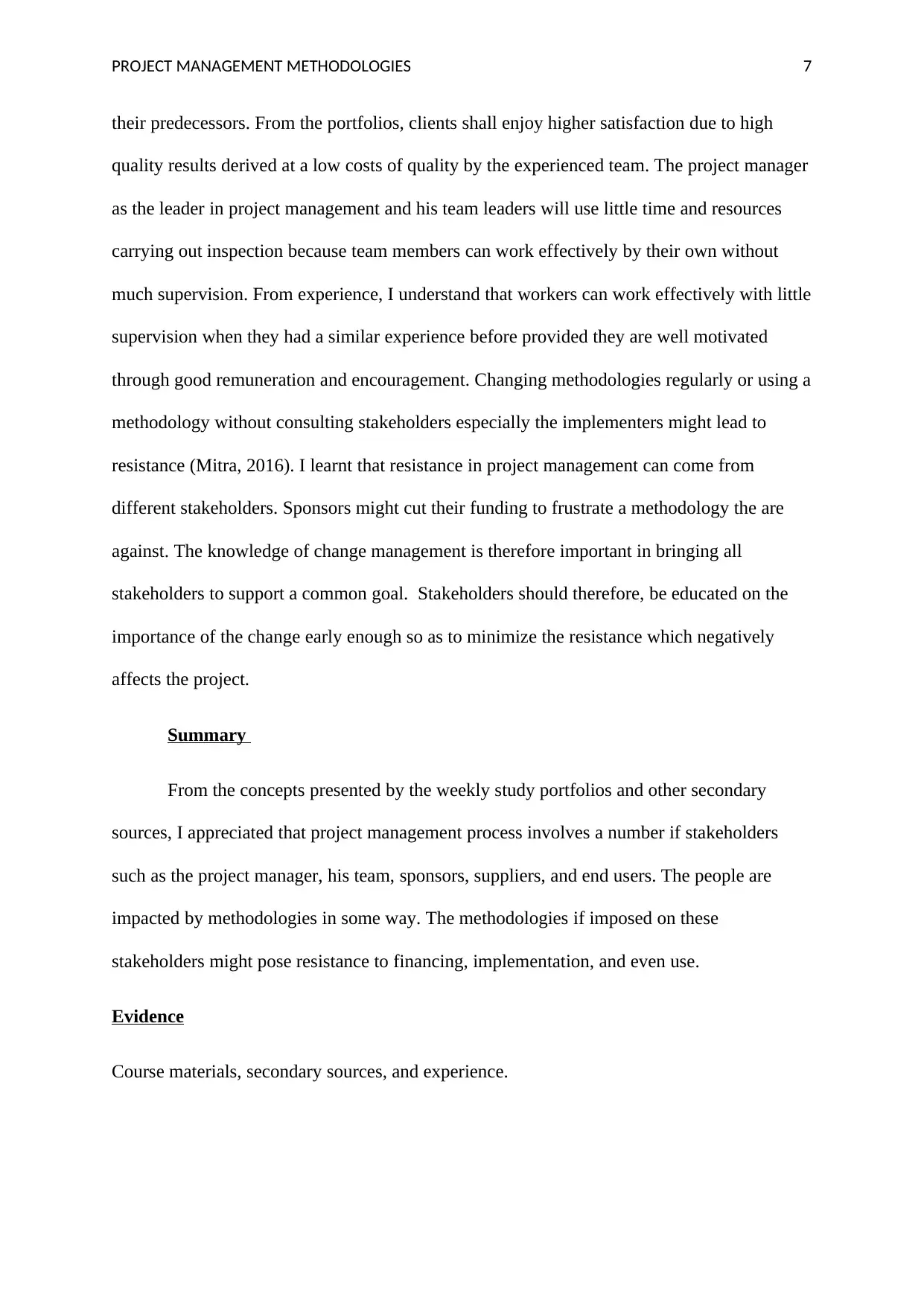
PROJECT MANAGEMENT METHODOLOGIES 7
their predecessors. From the portfolios, clients shall enjoy higher satisfaction due to high
quality results derived at a low costs of quality by the experienced team. The project manager
as the leader in project management and his team leaders will use little time and resources
carrying out inspection because team members can work effectively by their own without
much supervision. From experience, I understand that workers can work effectively with little
supervision when they had a similar experience before provided they are well motivated
through good remuneration and encouragement. Changing methodologies regularly or using a
methodology without consulting stakeholders especially the implementers might lead to
resistance (Mitra, 2016). I learnt that resistance in project management can come from
different stakeholders. Sponsors might cut their funding to frustrate a methodology the are
against. The knowledge of change management is therefore important in bringing all
stakeholders to support a common goal. Stakeholders should therefore, be educated on the
importance of the change early enough so as to minimize the resistance which negatively
affects the project.
Summary
From the concepts presented by the weekly study portfolios and other secondary
sources, I appreciated that project management process involves a number if stakeholders
such as the project manager, his team, sponsors, suppliers, and end users. The people are
impacted by methodologies in some way. The methodologies if imposed on these
stakeholders might pose resistance to financing, implementation, and even use.
Evidence
Course materials, secondary sources, and experience.
their predecessors. From the portfolios, clients shall enjoy higher satisfaction due to high
quality results derived at a low costs of quality by the experienced team. The project manager
as the leader in project management and his team leaders will use little time and resources
carrying out inspection because team members can work effectively by their own without
much supervision. From experience, I understand that workers can work effectively with little
supervision when they had a similar experience before provided they are well motivated
through good remuneration and encouragement. Changing methodologies regularly or using a
methodology without consulting stakeholders especially the implementers might lead to
resistance (Mitra, 2016). I learnt that resistance in project management can come from
different stakeholders. Sponsors might cut their funding to frustrate a methodology the are
against. The knowledge of change management is therefore important in bringing all
stakeholders to support a common goal. Stakeholders should therefore, be educated on the
importance of the change early enough so as to minimize the resistance which negatively
affects the project.
Summary
From the concepts presented by the weekly study portfolios and other secondary
sources, I appreciated that project management process involves a number if stakeholders
such as the project manager, his team, sponsors, suppliers, and end users. The people are
impacted by methodologies in some way. The methodologies if imposed on these
stakeholders might pose resistance to financing, implementation, and even use.
Evidence
Course materials, secondary sources, and experience.
Paraphrase This Document
Need a fresh take? Get an instant paraphrase of this document with our AI Paraphraser
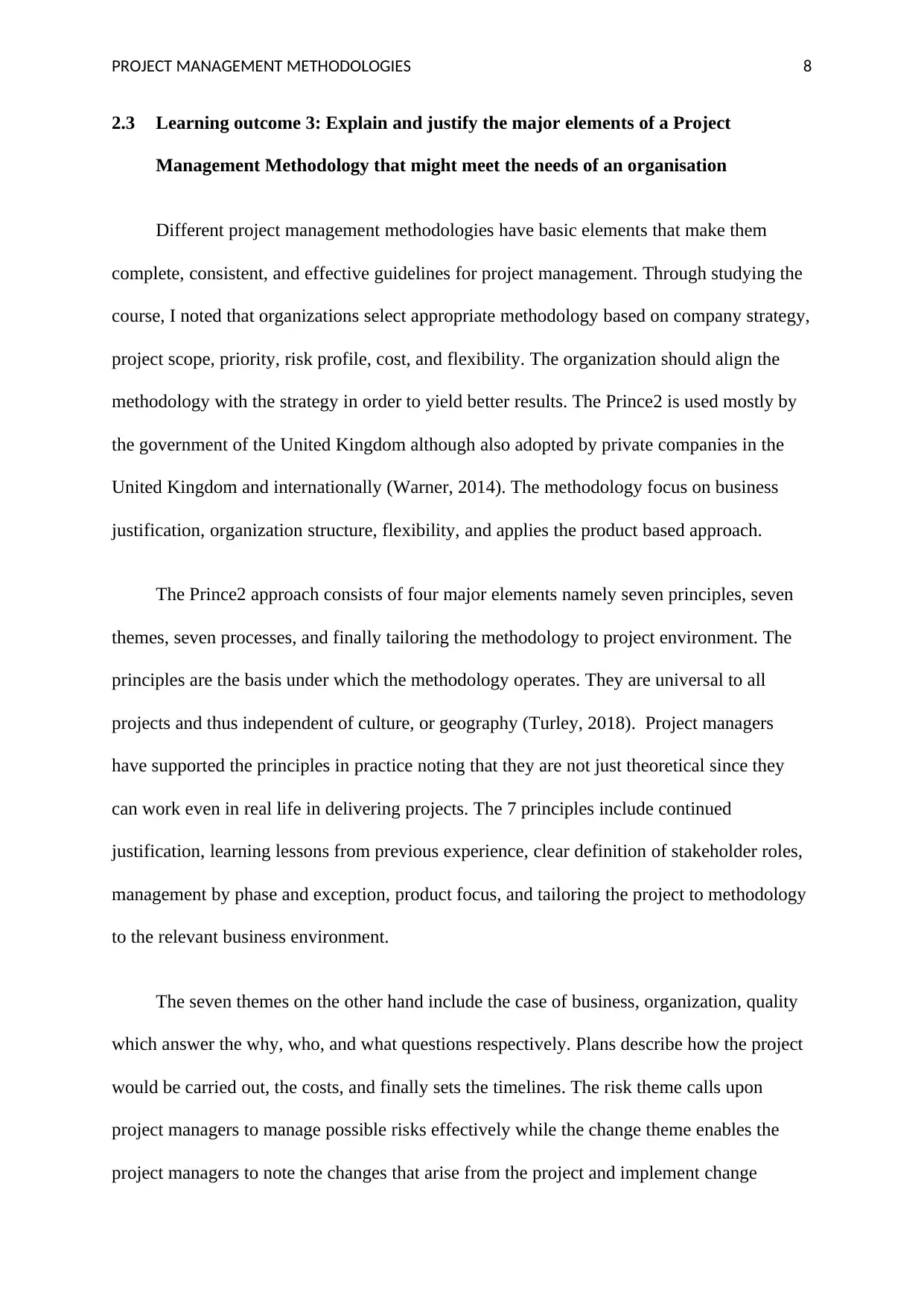
PROJECT MANAGEMENT METHODOLOGIES 8
2.3 Learning outcome 3: Explain and justify the major elements of a Project
Management Methodology that might meet the needs of an organisation
Different project management methodologies have basic elements that make them
complete, consistent, and effective guidelines for project management. Through studying the
course, I noted that organizations select appropriate methodology based on company strategy,
project scope, priority, risk profile, cost, and flexibility. The organization should align the
methodology with the strategy in order to yield better results. The Prince2 is used mostly by
the government of the United Kingdom although also adopted by private companies in the
United Kingdom and internationally (Warner, 2014). The methodology focus on business
justification, organization structure, flexibility, and applies the product based approach.
The Prince2 approach consists of four major elements namely seven principles, seven
themes, seven processes, and finally tailoring the methodology to project environment. The
principles are the basis under which the methodology operates. They are universal to all
projects and thus independent of culture, or geography (Turley, 2018). Project managers
have supported the principles in practice noting that they are not just theoretical since they
can work even in real life in delivering projects. The 7 principles include continued
justification, learning lessons from previous experience, clear definition of stakeholder roles,
management by phase and exception, product focus, and tailoring the project to methodology
to the relevant business environment.
The seven themes on the other hand include the case of business, organization, quality
which answer the why, who, and what questions respectively. Plans describe how the project
would be carried out, the costs, and finally sets the timelines. The risk theme calls upon
project managers to manage possible risks effectively while the change theme enables the
project managers to note the changes that arise from the project and implement change
2.3 Learning outcome 3: Explain and justify the major elements of a Project
Management Methodology that might meet the needs of an organisation
Different project management methodologies have basic elements that make them
complete, consistent, and effective guidelines for project management. Through studying the
course, I noted that organizations select appropriate methodology based on company strategy,
project scope, priority, risk profile, cost, and flexibility. The organization should align the
methodology with the strategy in order to yield better results. The Prince2 is used mostly by
the government of the United Kingdom although also adopted by private companies in the
United Kingdom and internationally (Warner, 2014). The methodology focus on business
justification, organization structure, flexibility, and applies the product based approach.
The Prince2 approach consists of four major elements namely seven principles, seven
themes, seven processes, and finally tailoring the methodology to project environment. The
principles are the basis under which the methodology operates. They are universal to all
projects and thus independent of culture, or geography (Turley, 2018). Project managers
have supported the principles in practice noting that they are not just theoretical since they
can work even in real life in delivering projects. The 7 principles include continued
justification, learning lessons from previous experience, clear definition of stakeholder roles,
management by phase and exception, product focus, and tailoring the project to methodology
to the relevant business environment.
The seven themes on the other hand include the case of business, organization, quality
which answer the why, who, and what questions respectively. Plans describe how the project
would be carried out, the costs, and finally sets the timelines. The risk theme calls upon
project managers to manage possible risks effectively while the change theme enables the
project managers to note the changes that arise from the project and implement change
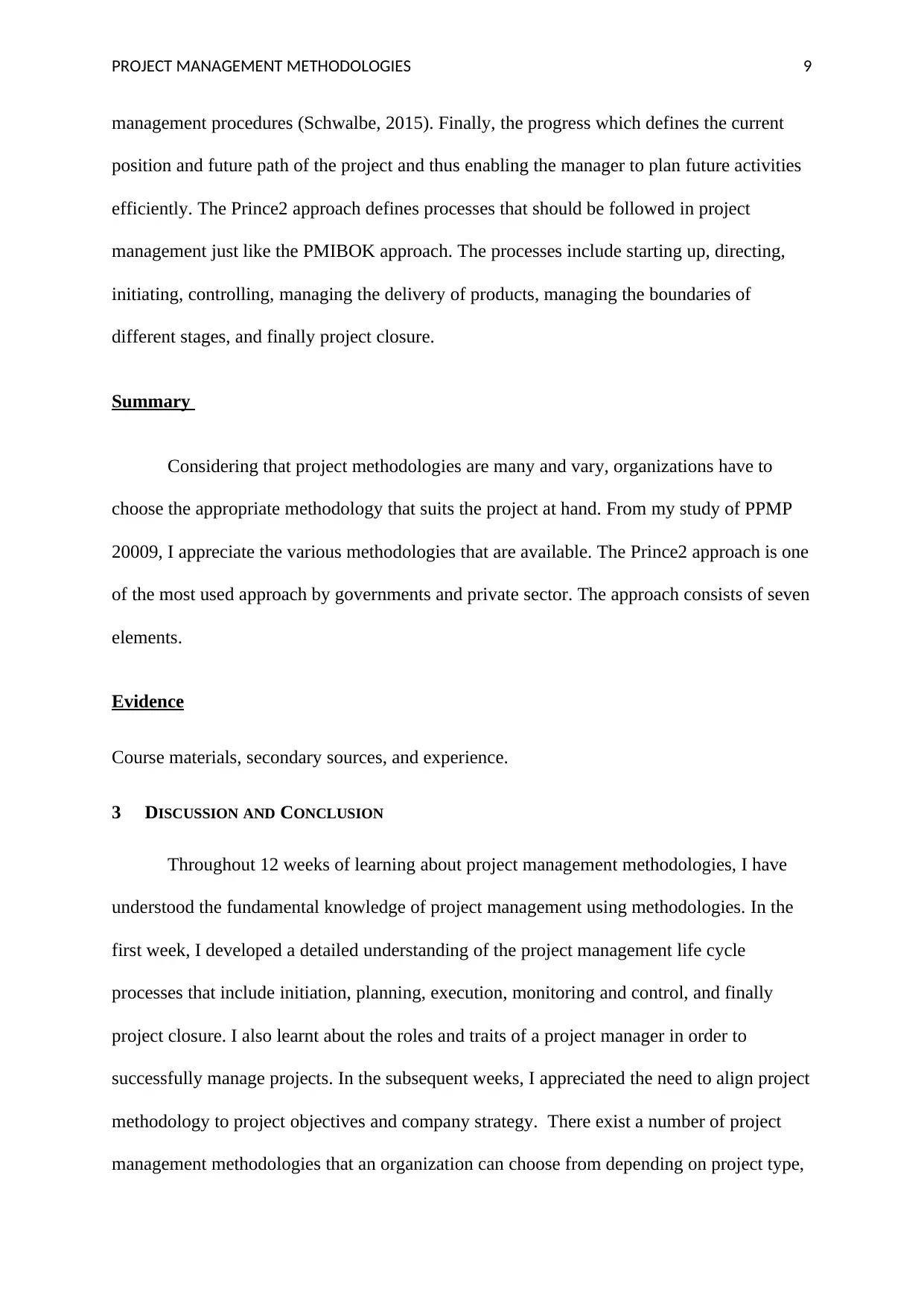
PROJECT MANAGEMENT METHODOLOGIES 9
management procedures (Schwalbe, 2015). Finally, the progress which defines the current
position and future path of the project and thus enabling the manager to plan future activities
efficiently. The Prince2 approach defines processes that should be followed in project
management just like the PMIBOK approach. The processes include starting up, directing,
initiating, controlling, managing the delivery of products, managing the boundaries of
different stages, and finally project closure.
Summary
Considering that project methodologies are many and vary, organizations have to
choose the appropriate methodology that suits the project at hand. From my study of PPMP
20009, I appreciate the various methodologies that are available. The Prince2 approach is one
of the most used approach by governments and private sector. The approach consists of seven
elements.
Evidence
Course materials, secondary sources, and experience.
3 DISCUSSION AND CONCLUSION
Throughout 12 weeks of learning about project management methodologies, I have
understood the fundamental knowledge of project management using methodologies. In the
first week, I developed a detailed understanding of the project management life cycle
processes that include initiation, planning, execution, monitoring and control, and finally
project closure. I also learnt about the roles and traits of a project manager in order to
successfully manage projects. In the subsequent weeks, I appreciated the need to align project
methodology to project objectives and company strategy. There exist a number of project
management methodologies that an organization can choose from depending on project type,
management procedures (Schwalbe, 2015). Finally, the progress which defines the current
position and future path of the project and thus enabling the manager to plan future activities
efficiently. The Prince2 approach defines processes that should be followed in project
management just like the PMIBOK approach. The processes include starting up, directing,
initiating, controlling, managing the delivery of products, managing the boundaries of
different stages, and finally project closure.
Summary
Considering that project methodologies are many and vary, organizations have to
choose the appropriate methodology that suits the project at hand. From my study of PPMP
20009, I appreciate the various methodologies that are available. The Prince2 approach is one
of the most used approach by governments and private sector. The approach consists of seven
elements.
Evidence
Course materials, secondary sources, and experience.
3 DISCUSSION AND CONCLUSION
Throughout 12 weeks of learning about project management methodologies, I have
understood the fundamental knowledge of project management using methodologies. In the
first week, I developed a detailed understanding of the project management life cycle
processes that include initiation, planning, execution, monitoring and control, and finally
project closure. I also learnt about the roles and traits of a project manager in order to
successfully manage projects. In the subsequent weeks, I appreciated the need to align project
methodology to project objectives and company strategy. There exist a number of project
management methodologies that an organization can choose from depending on project type,
⊘ This is a preview!⊘
Do you want full access?
Subscribe today to unlock all pages.

Trusted by 1+ million students worldwide
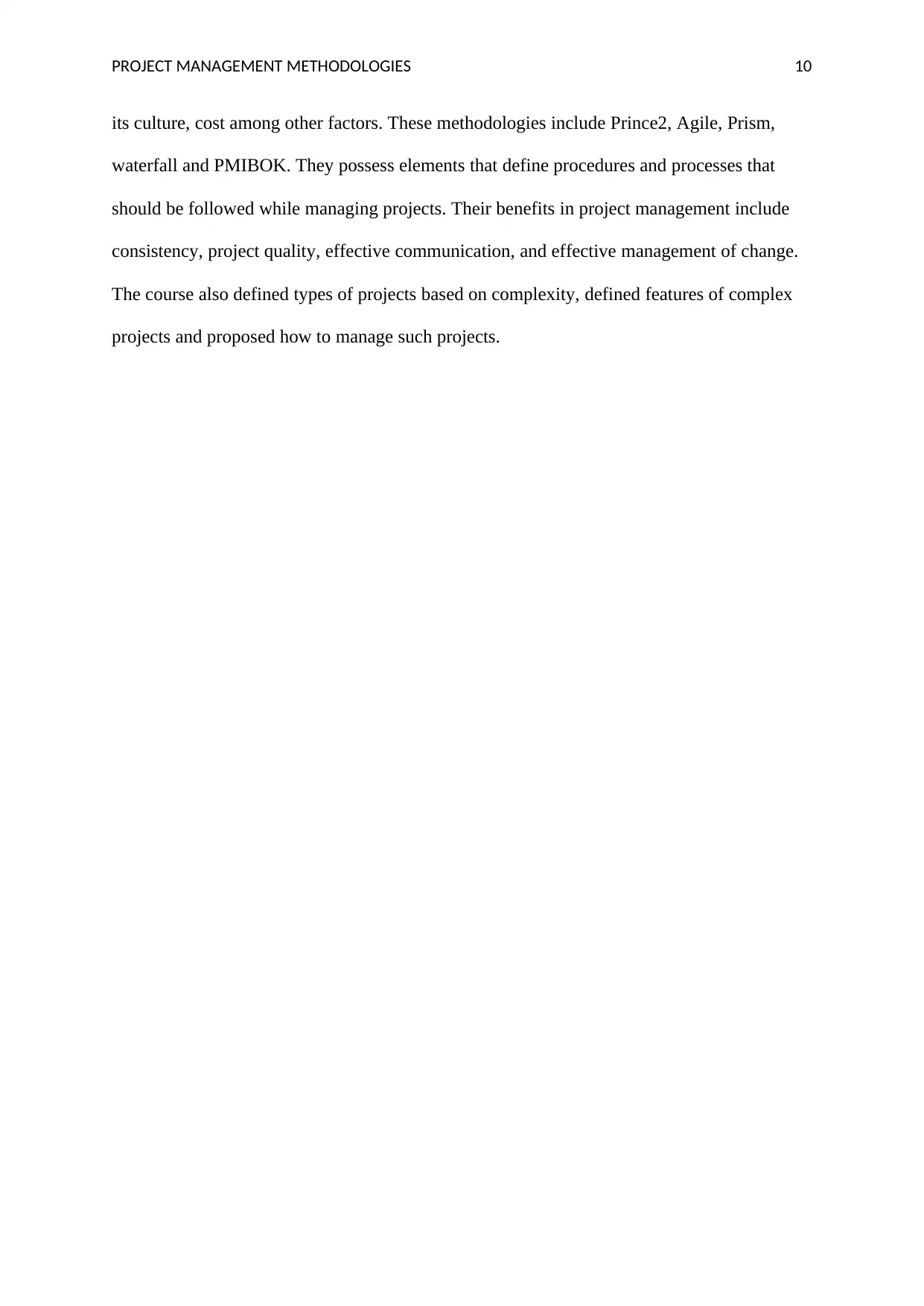
PROJECT MANAGEMENT METHODOLOGIES 10
its culture, cost among other factors. These methodologies include Prince2, Agile, Prism,
waterfall and PMIBOK. They possess elements that define procedures and processes that
should be followed while managing projects. Their benefits in project management include
consistency, project quality, effective communication, and effective management of change.
The course also defined types of projects based on complexity, defined features of complex
projects and proposed how to manage such projects.
its culture, cost among other factors. These methodologies include Prince2, Agile, Prism,
waterfall and PMIBOK. They possess elements that define procedures and processes that
should be followed while managing projects. Their benefits in project management include
consistency, project quality, effective communication, and effective management of change.
The course also defined types of projects based on complexity, defined features of complex
projects and proposed how to manage such projects.
Paraphrase This Document
Need a fresh take? Get an instant paraphrase of this document with our AI Paraphraser
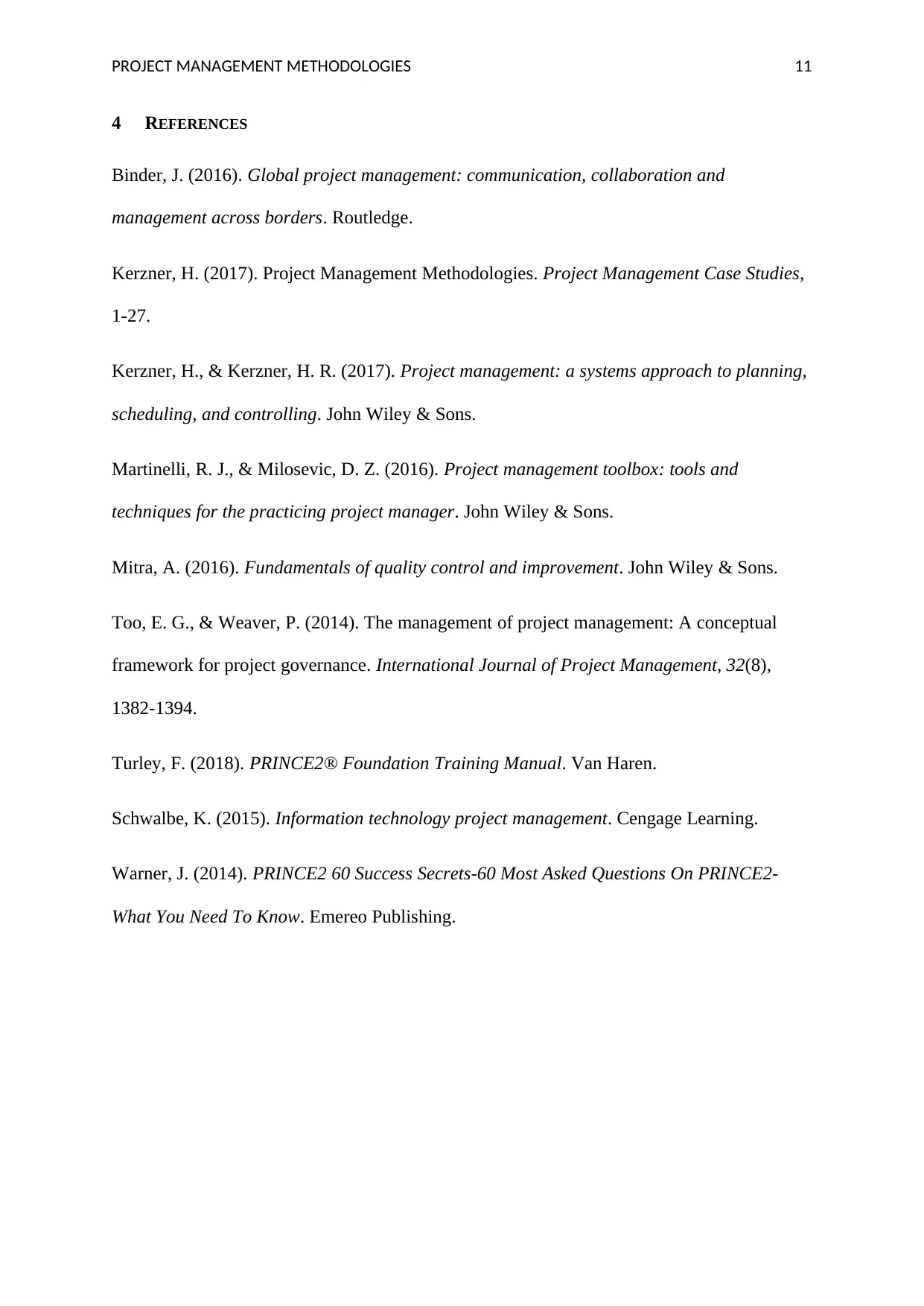
PROJECT MANAGEMENT METHODOLOGIES 11
4 REFERENCES
Binder, J. (2016). Global project management: communication, collaboration and
management across borders. Routledge.
Kerzner, H. (2017). Project Management Methodologies. Project Management Case Studies,
1-27.
Kerzner, H., & Kerzner, H. R. (2017). Project management: a systems approach to planning,
scheduling, and controlling. John Wiley & Sons.
Martinelli, R. J., & Milosevic, D. Z. (2016). Project management toolbox: tools and
techniques for the practicing project manager. John Wiley & Sons.
Mitra, A. (2016). Fundamentals of quality control and improvement. John Wiley & Sons.
Too, E. G., & Weaver, P. (2014). The management of project management: A conceptual
framework for project governance. International Journal of Project Management, 32(8),
1382-1394.
Turley, F. (2018). PRINCE2® Foundation Training Manual. Van Haren.
Schwalbe, K. (2015). Information technology project management. Cengage Learning.
Warner, J. (2014). PRINCE2 60 Success Secrets-60 Most Asked Questions On PRINCE2-
What You Need To Know. Emereo Publishing.
4 REFERENCES
Binder, J. (2016). Global project management: communication, collaboration and
management across borders. Routledge.
Kerzner, H. (2017). Project Management Methodologies. Project Management Case Studies,
1-27.
Kerzner, H., & Kerzner, H. R. (2017). Project management: a systems approach to planning,
scheduling, and controlling. John Wiley & Sons.
Martinelli, R. J., & Milosevic, D. Z. (2016). Project management toolbox: tools and
techniques for the practicing project manager. John Wiley & Sons.
Mitra, A. (2016). Fundamentals of quality control and improvement. John Wiley & Sons.
Too, E. G., & Weaver, P. (2014). The management of project management: A conceptual
framework for project governance. International Journal of Project Management, 32(8),
1382-1394.
Turley, F. (2018). PRINCE2® Foundation Training Manual. Van Haren.
Schwalbe, K. (2015). Information technology project management. Cengage Learning.
Warner, J. (2014). PRINCE2 60 Success Secrets-60 Most Asked Questions On PRINCE2-
What You Need To Know. Emereo Publishing.
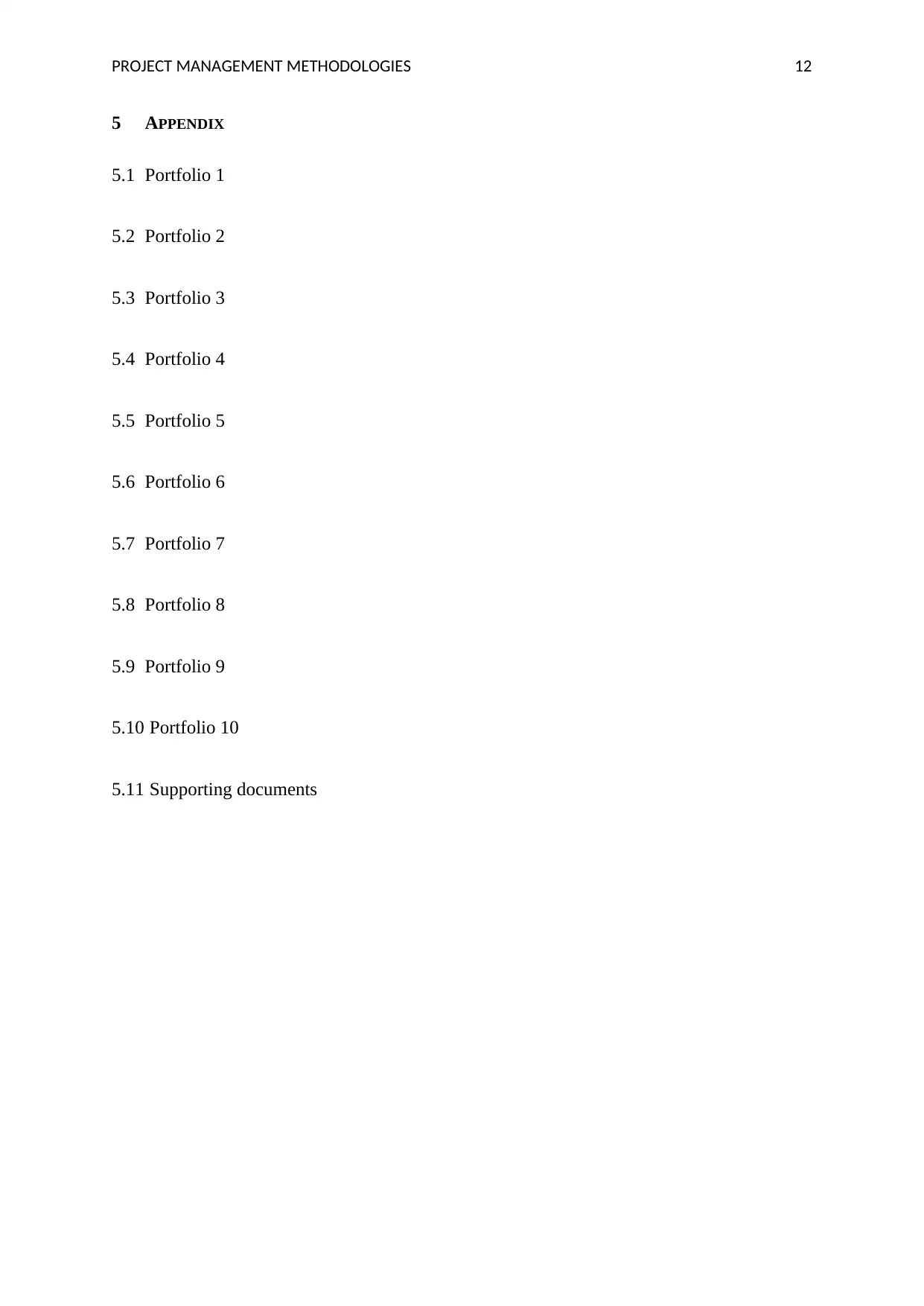
PROJECT MANAGEMENT METHODOLOGIES 12
5 APPENDIX
5.1 Portfolio 1
5.2 Portfolio 2
5.3 Portfolio 3
5.4 Portfolio 4
5.5 Portfolio 5
5.6 Portfolio 6
5.7 Portfolio 7
5.8 Portfolio 8
5.9 Portfolio 9
5.10 Portfolio 10
5.11 Supporting documents
5 APPENDIX
5.1 Portfolio 1
5.2 Portfolio 2
5.3 Portfolio 3
5.4 Portfolio 4
5.5 Portfolio 5
5.6 Portfolio 6
5.7 Portfolio 7
5.8 Portfolio 8
5.9 Portfolio 9
5.10 Portfolio 10
5.11 Supporting documents
⊘ This is a preview!⊘
Do you want full access?
Subscribe today to unlock all pages.

Trusted by 1+ million students worldwide
1 out of 12
Related Documents
Your All-in-One AI-Powered Toolkit for Academic Success.
+13062052269
info@desklib.com
Available 24*7 on WhatsApp / Email
![[object Object]](/_next/static/media/star-bottom.7253800d.svg)
Unlock your academic potential
Copyright © 2020–2026 A2Z Services. All Rights Reserved. Developed and managed by ZUCOL.

